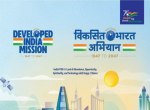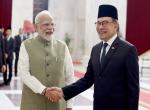There is a story, alleged not to be apocryphal, about one of the districts of old CP and Berar (later Madhya Pradesh) in which the police was investigating a major case of house breaking. The police had detained a suspect and the Superintendent of Police (S.P.), an Englishman, asked the investigating officer about progress in the case. The Thanedar said that he had a suspect in his custody and that he was questioning him with ‘Hikmat Amli’. Despite this the suspect refused to divulge any information. The S.P. immediately told the Thanedar to produce ‘Hikmat Ali’ before him and told him that he would break the man in five minutes. The poor Thanedar did not know how to suppress his laughter.
There is a sequel to this story, definitely not apocryphal, concerning Rajiv Gandhi and me. The Babri Masjid agitation was in full swing, the Sangh Parivar was determined to build a Ram Temple where the Masjid stood, kar seva had been threatened, the Shah Bano case had taken place and Rajiv’s efforts to placate the Mullahs had aroused Hindu anger, which he tried to assuage by arranging the foundation stone laying ceremony by the Home Minister, Buta Singh, at a site near but just outside the disputed area. Rajiv Gandhi had achieved the miracle of annoying both Hindus and Muslims, the temple issue was very much alive and communal relations were deteriorating fast. This, despite Rajiv Gandhi’s fatuous statement that in Ram Rajya Hindus and Muslims live together in brotherhood. All one could say was, “Father, forgive him for he knows not what he sayeth”
To return to the main story, in a meeting with the Prime Minister I told him that it was a pity that government no longer had any clue of how to deal with any problem with hikmat. Rajiv wanted to know what hikmat meant and that I had to tell him that there was no exact translation of the word. In spirit it meant broad, practical commonsense coupled with the will to solve problems rather than aggravate them. He asked me what all this had to do with the Babri Masjid case. My reply to him was that in his place I would have referred to the Uttar Ramayan in which it is stated that when Ram took ‘Jal Samadhi’ the whole of Ayodhya became ‘jal magna’ under the Saryu River. Therefore, unless the Saryu had changed its course and the original Ayodhya had reemerged in its present shape, modern Ayodhya could not be the Ayodhya of Ram. Therefore, excavations could have been done in a radius of ten kilometers from the centre of the present town, which would undoubtedly reveal some remnants of old buildings long since buried under the ground. These remains could be carbon dated and declared to be several thousand years old. Renowned archaeologists could be summoned and they could certify that this was the true Ayodhya of Ram. Just as Raza Shah Pahlevi reconstructed Persipolis, the ancient capital of Persia, the Government of India would spend several hundred crores of rupees to revive the newly discovered city of Ayodhya. The followers of Ram could then have been persuaded to switch their kar seva to the Ayodhya identified as authentic, the Babri Masjid could have been saved and aggravation of communal hatred between Hindus and Muslims could have been prevented. What a difference this would have made to peace and harmony in India.
I told Rajiv that this was an example of hikmat. Rajiv asked me what would happen if carbon dating did not establish the antiquity of the remains or the renowned archaeologists refused to authenticate the new site as Ram’s Ayodhya. I told him that there was nothing that money could not buy and even if this meant telling a lie, he should remember that even Yudhishtir’s “Narova Kunjarova” was a permissible lapse and, because it was for the greater good, it came within the definition of hikmat.
In administration hikmat means many things. It means total openness in government and total approachability of all officers so that the average citizen could walk into any government office and expect an immediate hearing. My system of working was to hold open house every day, which came to be referred to as my darbar, in which any citizen could walk in, ventilate his grievances, get a patient hearing and either an immediate remedy or a final answer within a given time frame. I used this very successfully in the Delhi Development Authority which was going through a bad time because it had gained much unpopularity during the Emergency. My darbar, the hearing that people got, the time bound remedy which was given to them all helped to restore the credibility of the institution and our acceptability by the people. One example is that of an auto rickshaw driver who came to me, found that there were no guards at the door, that he could walk in without an appointment and be politely dealt with. His problem was that he was unable to get a house though he was entitled to it more than seven years ago. His case was solved within an hour, he got his house and thirty-three years after the event both he and his son keep in touch to express their gratitude. Actually I had done nothing for him which was not his due, but because I was wedded to hikmat my attitude was one of help rather than of hindrance.
Hikmat often requires an unusual approach to problems and out of the ordinary solutions. One example will suffice to illustrate the point. A person came to my office when I was D.C at Ujjain and alleged that his uncle had trespassed on his land. Instead of transferring the matter to the Tahsil court to be dealt with according to law, I decided to send for the uncle. That man arrived with one of the leading advocates of Madhya Pradesh, who went on to become our Advocate General. Naturally the advocate protested at my calling his client without a case being formally registered, but I invited him to share the dais with me in my courtroom, which he did reluctantly. I asked both the parties to state their case and then sent for the Tehsildar. I told the Tehsildar to take the complainant and the defendant out of my court, question them with strictness and find out the truth of the matter. I also told him that one of the two was telling a lie and that after investigation the liar should be brought to my court to be publicly whipped. The advocate raised a protest but I took him to my chambers and calmed him down with a cup of tea. Within minutes the two parties came to me and said that the matter was settled between themselves. I then reminded the advocate that this was hikmat at play and that a matter which could have dragged on for years in court was settled in less than half an hour. Every case cannot be solved this way, but certainly a broadly commonsense based approach does help in the settlement of disputes.
A prime example of hikmat was displayed by Morarji Desai, the then Prime Minister. General Zia Ul Huq told him that if India handed over Kashmir to Pakistan he would promise eternal peace between the two countries. Any other person would have argued the pitch with Zia, but Morarji resorted to hikmat. He told Zia that he could have Kashmir that very day, but was he also prepared to take fourteen crores Indian Muslims with Kashmir. When Zia expressed surprise at this statement Morarji told him that after partition we opted for a secular democratic, multi-ethnic, multi-religious State which has become the largest Islamic country in the world after Indonesia. India has one Sikh majority State, the Punjab, two Buddhist majority States, Sikkim and Arunachal Pradesh, three Christian majority States, Meghalaya, Nagaland and Mizoram and one Muslim majority State, Jammu & Kashmir. If that State breaks away from India because Muslims cannot live with other Indians then where would be the justification for secularism or the presence of even one Muslim on Indian soil? Zia immediately caught the point and promised that so long as Morarji was Prime Minister he would not utter the word Kashmir. He kept his promise so long as Morarji was Prime Minister. If Morarji had reacted angrily to Zia’s suggestion the matter would have degenerated into a free fight. Hikmat made him turn the tables on Zia because he had no answer to what Morarji had said.
Today the word hikmat is totally missing from the vocabulary of the Indian State. Anna Hazare threatens a hunger strike and government foolishly arrests him. Hikmat would have meant that government prepares the place where the hunger strike was to occur and let Anna occupy it with fanfare. If hikmat had been used the hunger strike would have broken in a few days, especially if hikmat were accompanied by clearly visible, palpably tangible steps taken by government to curb corruption and improve governance. Government has no hikmat or commonsense and it suffers from a paralysis of the type of decision making which would permit it to provide good government to the country. The presence of corruption, terrorism, goonda raj, etc., is a natural corollary of the absence of good government because the opposite of government is anarchy and crime flourishes best in a state of anarchy.
How does one promote hikmat? First and foremost our officers and politicians must remember that the people of India are not their enemies but rather the very reason for the existence of these officials. Therefore, officials must freely interact with people and try and gauge the mood of the people. All officials must have a sense of humour which enables them to laugh at themselves and to accept public abuse without being rattled. I was D.C. Ujjain when the leader of the Socialist Party, Dr. Hariram Choube, organised a public meeting in which the most horrendously critical things were said about government. As D.C. I had my fair share of abuse, which I heard sitting patiently in my jeep near the crowd. Midway through the programme Dr. Choube was sent a slip reminding him of the issues on which I had not been criticised and the words of abuse which had been missed out in the tirade against me. Dr. Choube received the slip and paused to read it. He was thrown off his stride and descended from the stage and asked me what I was doing there. I said it was my duty to be present at a place where a public agitation was being organised. He asked me what the devil I meant by sending him a slip and why did I not react to the abuse heaped on me. My reply was that I was paid to listen even to abuse and that I sent the slip because I did not want him to miss out on any point. Dr. Choube was so put off that the meeting terminated there and then. A sense of humour and an approach to a situation through hikmat served me well that day.
Hiktmat requires discretion on the part of an officer which permits him to react where such reaction is called for, to be silent when that is called for, to be firm when that is called for and to be accommodative when that is called for. Hikmat also demands a total absence of red tape because only then will people be confident that when they approach government for any work they will receive a positive response. Sometimes hikmat means choosing the lesser evil when faced with the choice between that and a greater evil. John Lawrence as Chief Commissioner of the Punjab in 1857 decided that under the given circumstances the non-Punjabi, non-Pathan, non-Gurkha elements of the Indian Army could not be trusted and that it was necessary to disarm the native regiments in various garrisons in the Punjab and NWFP. Despite the protest of the British officers commanding these regiments John Lawrence ruthlessly enforced his order and by and large the Punjab was saved from mutiny of the Army of the East India Company. Those regiments which were not disarmed revolted, but John Lawrence showed great firmness, pursued these regiments, disarmed them and executed the mutineers. Some were shot, some were hanged and some were lashed to the mouths of cannon and blown to bits in order to create an atmosphere of awe. From the Indian point of view Lawrence committed an atrocity, but from a British point of view he acted with firmness and exhibited himkat at this height.
One must end with a story of Sardar Patel’s hikmat. At the time of merger the Maharaja of Jodhpur, like other Maharajas, was given a privy purse, two palaces and agricultural land recorded as Sarf-e-khas. When Sardar asked the Maharaja whether he wanted anything more he said that he wanted Mehrangarh Fort also. When Jayanarayan Vyas, who was to be Chief Minister of Rajasthan, protested Sardar told him, “Jodhpur has made over his entire State to you and you can build a new fort every year. Let the Maharaja keep Mehrangarh Fort”. Vyas had no answer to this, but Jodhpur, who had been most hostile to India, became Sardar Patel’s slave for life. This is what hikmat can achieve. I can certainly suggest this as one of the mantras of good government.
------------------------------------------------
Published Date : 25th November 2011









Post new comment